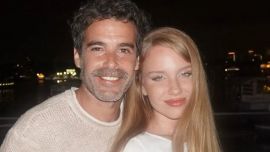Hopefully tomorrow’s debate will do something to swing this election one way or another because last Sunday’s Santiago del Estero shadowboxing failed to tilt it in any direction, despite containing the body (the economy) and soul (human rights) of issues. Yet Albert Einstein’s definition of insanity (doing the same thing and expecting different results) would suggest not if the rigid format is repeated – the encounter was far too scripted to allow even such a jet-black swan as Buenos Aires Province Cabinet Chief Martín Insaurralde’s political suicide to liven things up.
With everything premised towards that end, there were no losers and almost no winners – if a victor had to be picked among the quintet, it would probably have to be Economy Minister Sergio Massa as the government candidate but only for that reason because the status quo probably stands most to gain with no winners or losers. PASO primary winner Javier Milei failed to build on his lead with the libertarian “lion” indeed turned into a pussy-cat, in the mocking words of leftist Myriam Bregman, but not for being in hock to big business – the anarcho-capitalist was lost amid such stringent rules, even within his comfort zone of the economy with dollarisation one of the debate’s biggest absentees. If mainstream opposition candidate Patricia Bullrich occupied the centre of the stage, it was Massa who made the strongest play for the middle ground with his promise of national unity (he talked Radicals but may have been thinking more of Buenos Aires City Mayor Horacio Rodríguez Larreta’s 2.5 million votes).
So perverse was the structure that the most boring of the five presidential candidates was also the most impressive, at least in this columnist’s opinion – Córdoba Governor Juan Schiaretti. Continuously playing the federal card as the only one of the quintet born and bred inland and the only candidate with executive experience, he was able to squeeze his message into the scant minutes or seconds permitted by skipping any frills. Almost the only economic specifics came from his plodding monotone. In contrast to Bullrich, who when pressed (twice by Milei, once by Massa) to explain in more detail how she would “wipe inflation off the map” by virtue of having a plan, a team and the guts, could not offer anything beyond attacking the fiscal deficit. Rather than such hot air or blanket austerity, Schiaretti argued that over 10 percent of gross domestic product could be saved by weeding out the overlap between the three levels of government, state company deficits, economic subsidies and tax evasion – more concrete than Milei’s more general proposals of state and tax reform, public spending cuts, deregulation and privatisation (and, of course, shuttering the Central Bank). Milei did point out that the quasi-fiscal deficit (Leliqs etc.) almost doubled the fiscal but in general was stronger on diagnosis than solutions. Massa was almost visionary with his post-modern digital currency but has to run such ideas past his record – as Schiaretti pointed out, his ministerial year has seen inflation doubled with the “blue” dollar up from 240 to 800 pesos and as Bullrich acidly put it: “How can you be a good president after being a bad minister?” (thus nixing the bogus distinction sought by Massa between this government and his own future presidency).
The economic bloc was the most disputed with no less than 19 of the 25 rights to reply available to the five candidates used (the other six were reserved for human rights with none deployed in the segment of education) – both Massa and Milei shot their bolts at this first stage. Education was the only issue dominated by the two main coalitions with Milei mum on his school vouchers (trenchantly criticised by Bullrich as only working in this city) – Massa pledged to raise public spending in this area from six to eight percent of GDP (he was reminded of its reduction in the 2024 budget) while Bullrich harped on Kirchnerite “indoctrination” and the devastating effects of pandemic lockdown.
In the human rights bloc Milei largely undid his admirable achievement in keeping his temper at bay throughout two hours. He spoke of the “human rights scam” (thus accepting the spurious Kirchnerite claim to monopolise that cause instead of disputing it) while his attempts to equate guerrilla and state terrorism (with the latter downplayed as “excesses”) attack the consensus reached in these four decades of democracy. If outgoing President Alberto Fernández ended up being his veep’s voice, Milei seems to be following suit with his running-mate Victoria Villarruel – he is at his most dangerous here. Bregman was at her scathing best in this segment – in general she was one of the most vibrant participants, generally managing to steer clear of Marxist dogmatism (except for her obsession with the International Monetary Fund).
Anyway that is probably enough on a story to be continued in this city tomorrow. Nor is there much to add from last week on a September 27 mayoral debate with few proposals.
Neither Sunday’s debate nor the passage of eight weeks have produced any paradigmatic shift from the three-way tie of the PASO primary. Of the five presidential candidates, only Schiaretti and Bregman (who curiously seems to be picking up almost no leftist votes from the five percent of Juan Grabois) look out of the November run-off. Rather than arguably winning the debate by default, Massa’s chances of at least reaching November lie in his ability to throw money at his many problems but double-digit monthly inflation is only beginning to bite and another black swan like Insaurralde could knock him out altogether. Milei is the primary frontrunner in an ideal “the worse, the better” context for an anti-system outsider but 70 percent of the PASO vote did go elsewhere. Bullrich could regain ground in provinces like Córdoba and Mendoza and even if not, one of her two main rivals could self-destruct. To be continued next week after tomorrow’s debate.






















Comments